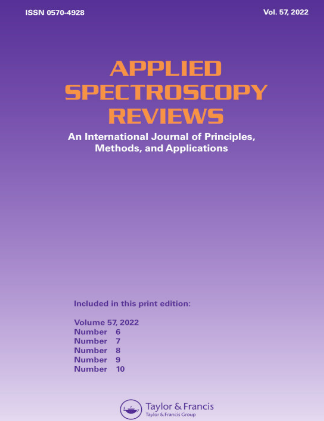激光烧蚀材料的远程分子组成分析
IF 5.4
2区 化学
Q1 INSTRUMENTS & INSTRUMENTATION
引用次数: 0
摘要
摘要:提出了一种远程检测岩石材料体分子组成的新方法。激光能量加热衬底上的局部区域;优化了熔剂以低分子解离率熔化和蒸发目标成分。衬底温度上升,直到在入射通量和潜在相变能之间建立平衡,在真空中达到~ 2500 K。黑体信号由受热点发出,通过蒸发的物质向外传播;反射光学元件将信号送入分光仪。羽流中的反振动吸收为鉴定底物的大块分子组成提供了诊断方法。基于激光和接收器特性以及靶材料特性,对具有可用先验分子截面的化合物进行吸收光谱建模。物质抛射通量驱动羽流密度剖面。定性的、物种特异性的光谱剖面是通过沿羽流路径积分分子截面得到的。模拟结果表明,吸收曲线很稳定。本文章由计算机程序翻译,如有差异,请以英文原文为准。
Remote molecular composition analysis of laser-ablated material
Abstract A novel method is described for remotely interrogating bulk molecular composition of rocky materials. Laser energy heats a local area on the substrate; flux is optimized to melt and evaporate target constituents with low rates of molecular dissociation. Substrate temperature rises until an equilibrium is established between incident flux and latent phase-change energies, reaching ˜2500 K in vacuum. A blackbody signal is emitted by the heated spot, traveling outward through the evaporated material; reflective optics direct the signal into a spectrometer. Ro-vibrational absorption in the plume provides a diagnostic for identifying bulk molecular composition of the substrate. Absorption spectra are modeled for compounds with available a priori molecular cross-sections, based on laser and receiver characteristics, and target material properties. Mass ejection flux drives the plume density profile. Qualitative, species-specific spectral profiles are derived by integrating molecular cross section along a path through the plume. Simulations indicate robust absorption profiles.
求助全文
通过发布文献求助,成功后即可免费获取论文全文。
去求助
来源期刊

Applied Spectroscopy Reviews
工程技术-光谱学
CiteScore
13.80
自引率
1.60%
发文量
23
审稿时长
1 months
期刊介绍:
Applied Spectroscopy Reviews provides the latest information on the principles, methods, and applications of all the diverse branches of spectroscopy, from X-ray, infrared, Raman, atomic absorption, and ESR to microwave, mass, NQR, NMR, and ICP. This international, single-source journal presents discussions that relate physical concepts to chemical applications for chemists, physicists, and other scientists using spectroscopic techniques.
 求助内容:
求助内容: 应助结果提醒方式:
应助结果提醒方式:


